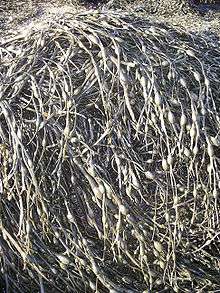Fucales
| Fucales | |
|---|---|
 | |
| Ascophyllum nodosum | |
| Scientific classification | |
| (unranked): | SAR |
| Superphylum: | Heterokonta |
| Class: | Phaeophyceae |
| Order: | Fucales Kylin |
| Families | |
|
Bifurcariopsidaceae | |
The Fucales (fucoids) are an order in the brown algae (class Phaeophyceae). The list of families in the Fucales, as well as additional taxonomic information on algae, is publicly accessible at Algaebase. [1]
The class Phaeophyceae is included within the division Heterokontophyta.[2] This name comes from the Greek word phaios meaning "brown" and phyton meaning plant.[3] They include some of the largest plants in the sea, but some are small and fine in structure.
Classification
The Fucales include some of the more common littoral seaweeds and the members of the order have the typical seaweed construction: a holdfast, stipe, and lamina. The lamina is often much branched and may include gas-filled bladders. Growth is by division of the apical cells.
They are oogamous - fusion between the small male gamete and the large female gamete.
References
- ↑ Guiry, M.D. and Guiry, G.M. 2006. AlgaeBase version 4.2. World-wide electronic publication, National University of Ireland, Galway. http://www.algaebase.org; searched on 7 December 2006
- ↑ Hardy, G. and Guiry, M.D. 2006. A Check-list and Atlas of the Seaweeds of Britain and Ireland. 2006. The British Phycologcal Society. ISBN 3-906166-35-X
- ↑ Huisman, J.M. 2000. Marine Plants of Australia. University of Western Australia Press, Australia. ISBN 1-876268-33-6
Further reading
- Fletcher, R.L.1987. Seaweeds of the British Isles. Volume 3, Part 1. British Museum (Natural History), London. ISBN 0-565-00992-3